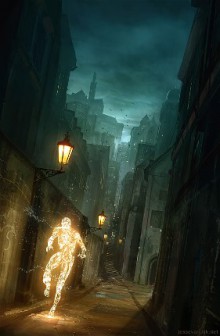Darren O’Shaughnessy’s debut novel, Ayuamarca: Procession of the Dead features a protagonist who has lost most of his memories. Capac Raimi, whose Inca name is of central but obscure significance, arrives in an unnamed city determined to make good in his chosen profession of gangster. To achieve this disreputable ambition he must obtain the patronage of The Cardinal, the boss of bosses, on whose sufferance all businessmen (legitimate or otherwise) depend, and at whose whim they frequently die, The Cardinal being a chaoticist who runs the entire show according to a system of his own based on pseudo-Jungian synchronicities. That patronage is acquired violently, and with suspicious ease. Raimi soon finds himself elevated to a gangland analogue of fast-track management trainee, and (like all such trainees) he meets lots of new people. As they’re a loquacious bunch the novel consists very largely of dialogue and Raimi’s reflections thereupon, so that the book is well advanced by the time he realizes that while he has a reasonable body of general knowledge, he has only a few wisps of memory from before getting off the train that brought him there. Nor is that all: How is it that a woman he befriends combines the face of a teenager with a ravaged body that has seen nearly six hard decades? How can a freelance assassin have continued for nearly forty years at the peak of that demanding profession? Whence comes the choking green mist that occasionally pervades the city? Most of all, how do people sometimes disappear, leaving behind no gap, no record and no memory save in Raimi’s own mind? O’Shaughnessy’s grim climax provides answers to all these questions, and leaves few loose ends; this is a self-contained novel, for all that it’s sub-titled The City Book 1. Presumably there’ll be more answers in Book 2, though there’s no real hint as to how any sequel might develop. Meanwhile, I hope O’Shaughnessy can extend his range somewhat. He offers stylized but inventive dialogue, but too many of his descriptive passages are perfunctory - one of Raimi’s memory fragments is the face of a woman who must at one time have meant something to him, but as we’re never told what she looks like she arouses less interest than she should. Occasionally he’s careless: at the crux of what should have been a powerful scene he suddenly produces an electric razor, when the context clearly demands a set of dog-clippers. Last and worst, his few passages of sex-writing are laughably inept, as he himself acknowledges, comparing one to “a schoolboy’s masturbatory fantasy.” A schoolboy of rather less than average finesse, I’m inclined to add; if you can’t do it well, leave it out.
/ reviews
/ Ayuamarca (Interzone)
Interzone | 27 February 2008 | Chris Gilmore
Read more...Return to reviews listing
Arra Sails essay
from Darren's Blog on 09 December 2024
Arra Sails remains one of the most popular characters from my Cirque Du Freak books, even though...
Read full entryTOUR details - see Shanville Monthly
from Events on 06 August 2017
Read full entry
